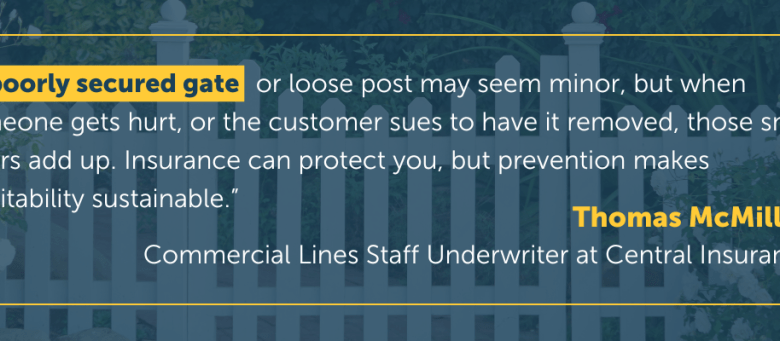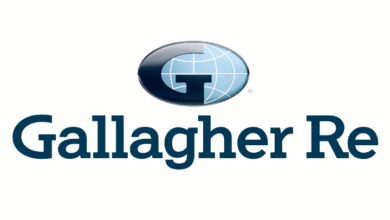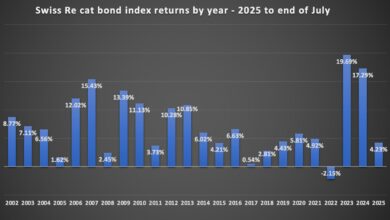What You Need to Know to Start

The fence installation industry goes beyond curb appeal by playing a key role in property development. With rising demand for security and outdoor living spaces, fence business profitability has steadily grown across urban and rural markets.
Launching a fence company takes grit, skill, and smart financial decisions. As a fence installer, you may wonder how to leap into launching your own business. Whether you’re installing residential privacy fencing or securing commercial properties with metal barricades, the path to a successful fence business starts with identifying and managing risks.
Here, Thomas McMillan, commercial lines staff underwriter at Central Insurance, dives into some key items you need to know about protecting your fence company. We explore what makes a fencing company profitable, common risks faced by fencing contractors, and how insurance protects that profit from the unexpected.
Key Factors That Impact Fence Business Profitability
The U.S. fencing market is currently at $12 billion, with gradual annual growth. Every new contractor wants to know: what impacts profit most? There are strategic steps fencing contractors can take to increase margins and reduce unnecessary risk. Aside from influential factors such as weather events and interest rates, here are four areas that can shape your fence company’s bottom line:
#1: Labor Costs
Skilled labor is essential in fencing work, but training your crew in proper installation and safety techniques can help prevent turnover and injury-related claims. Refer to the Occupational Safety and Health Administration (OSHA) for standards that help protect employees from common hazards.
Certification is also important for safety, training, and quality craftsmanship. Many organizations, including the American Fence Association (AFA) and The Fence University, offer professional certifications for industry standards and best practices.
#2: Material Pricing
The cost of wood, vinyl, and metal fencing fluctuates frequently. To protect profits, it’s essential to partner with trusted suppliers and quote jobs accurately.
It’s also important to be aware of industry trends and customer needs. Metal fencing continues to be the most popular material for residential and commercial fences, and demand for vinyl fencing continues to rise.
#3: Competition and Local Demand
Demand is heavily influenced by your region. Offering niche services such as wrought iron installation, repair work, fence post hole digging, or commercial fencing can help your company stand out. It’s also helpful to add seasonal services; fence repair and removal services can generate revenue during slower installation months.
Your location and reputation can influence how much your business needs to invest in marketing and advertising. Website development, a Google Business Profile, lead generation, mailers, Pay-per-click advertising, and social media can affect your company’s market share. Word of mouth referrals also have a strong influence on consumers, while excellent customer service and referrals are important to your fencing company’s success.
#4: Licensing, Permitting, and Insurance
Every fence installer should also be knowledgeable about local regulations and permits, including property rights and zoning laws. Being properly licensed and insured helps you win jobs and protect your investment. McMillan notes that clients often ask for proof of insurance before signing a contract. Without it, many jobs and profits are out of reach.
Get insights like this right in your inbox. Subscribe to the Central Blog below.
Understand the Risks Facing Fencing Contractors
As a fencing contractor, you operate in high-exposure environments with tools and materials on both residential and commercial property. As a result, accidents, injuries, and installation disputes can all lead to financial loss or legal action.
Common Risks That Can Impact Profitability
As McMillan explains, fencing contractors commonly face claims from:
- Improper Installation: Poorly secured fencing can lead to injuries or legal disputes if someone is harmed or property is damaged.
- Property Line Disputes: Installing a fence on the wrong side of a boundary could trigger costly removal and replacement fees.
- Injuries to Workers: Repetitive motion, exposure to sharp tools, or minor on-site accidents can trigger Workers’ Comp claims.
- Vehicle Accidents: Contractors often travel between multiple jobsites per day, increasing their auto liability risk.
- Site Hazards: Unattended equipment, open trenches, or leftover tools can lead to trip-and-fall claims or even trespassing incidents.
In McMillan’s words, “While digging post holes, the installer accidentally hits a water line, flooding the neighbor’s basement and damaging their property.” These common risk examples can impact profitability.
Important Insurance Policies for Fence Contractors
Many fencing companies start as small crews and grow into full-service operations that handle custom fabrication, repair, and multi-property installations. To protect against these common risks and keep your fencing profits high, McMillan recommends the following core policies:
General Liability Insurance
This policy generally covers bodily injury and property damage claims from third parties. For fence companies, this can range from a child being cut on exposed metal to damage caused by digging too close to utilities.
Contractor’s Errors & Omissions (E&O)
Often overlooked, E&O policies can help when improper installation leads to financial loss, but doesn’t cause physical harm. For example, if a fence is installed incorrectly on someone else’s property and must be removed and redone, E&O coverage can step in.
“This type of financial error is usually excluded in a general liability policy,” McMillan notes. “With contractors’ E&O, fence companies don’t have to eat the entire cost of the fix.”
Inland Marine Insurance
Many fencing contractors move equipment, tools, and materials between jobsites. Inland marine insurance helps cover these mobile assets if lost, stolen, or damaged in transit or on the jobsite.
Commercial Auto Insurance
Commercial auto coverage is essential if you use company-owned trucks to transport fencing materials or haul equipment. It can help cover collision costs, liability claims, and repairs in case of an accident.
Workers’ Compensation Insurance
Employees performing installations are subject to physical strain, minor cuts, or larger accidents. This policy helps cover medical expenses, lost wages, and return-to-work support after a jobsite injury.
Policyholders can use Central’s 24/7 nurse hotline immediately after the incident occurs when dealing with a Workers’ Compensation claim. This benefit guides you through the medical and insurance claims process. A streamlined Workers’ Compensation process helps employees get the healthcare they may need and get them back to work faster.
Umbrella Insurance
As McMillan notes, “Many GL or auto policies cap at $1 million per occurance. If you face a multi-million-dollar lawsuit after an injury or large property damage claim, umbrella insurance provides an extra layer of protection.”
Installers must balance precision with safety on every jobsite, whether building wood, vinyl, chain-link, or composite fences. McMillan recommends that contractors focus not only on insurance, but also on quality control, safety training, and working with experienced crews. Covering topics such as nail gun safety creates a less hazardous culture on-site.

Partner With Central to Protect What You’re Building
Choosing the right insurance partner is key. At Central, construction expertise runs deep, from underwriting to handling claims. Whether you’re just starting out or expanding your crew, our knowledgeable professionals can help you avoid oversights that compromise fence business profitability.
Central also offers access to loss control support, including safety reviews and equipment risk assessments. These resources can help identify issues before they become claims.
Final Thoughts: Building Profitability with Protection
The U.S. fencing industry is a critical yet often overlooked segment of the construction sector. If you’re launching or growing a fencing company, don’t wait until a claim forces you to reevaluate your insurance. The right coverage can help protect your operations, reputation, and profitability for the long haul.
Ready to protect your fence business and boost long-term profitability? Talk to a trusted independent Central agent to tailor a policy that supports your goals.

The information above is of a general nature and your policy and coverages provided may differ from the examples provided. Please read your policy in its entirety to determine your actual coverage available.
Products underwritten by Central Insurance and affiliated companies.
Copyright © 2025 Central Insurance. All rights reserved.



